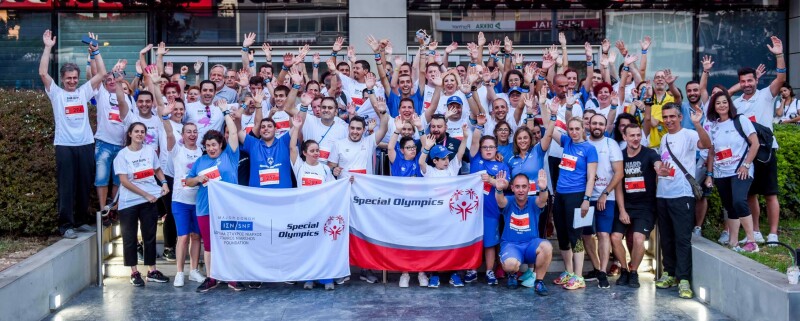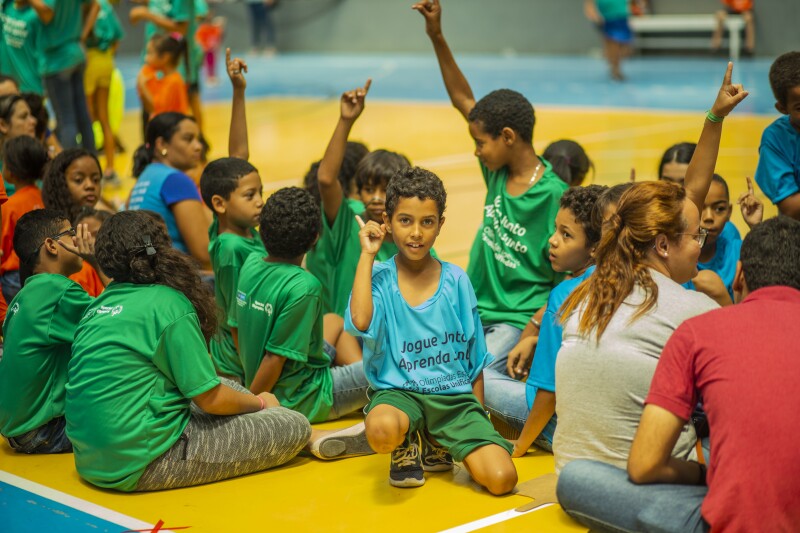We’re taught to look before we leap, but when it comes to inclusion for people with intellectual disabilities, it’s past time to take the leap and look around to see where we’ve landed. From what we’ve seen in partnering with Special Olympics over the years, we at the Stavros Niarchos Foundation (SNF) are confident that it will be in a better place.

Part of what’s so special about Special Olympics is the element of the unexpected in its impact: participants don’t necessarily go into its activities anticipating that their mindsets will change, but in the fact of doing, of playing and interacting with one another in a mutually respectful setting, the change comes. To experience inclusive sport is to see its value.
“Because of Play Unified: Learn Unified, I shared activities with people with intellectual disabilities for the first time,” says Adja, a student with Special Olympics Senegal. “I made great friends, and my mindset has changed.”
Adja, now a coach for Special Olympics Senegal, probably didn’t go into those activities with the idea that her mindset would change in a particular way as a result, just as Special Olympics students in Greece likely didn’t enter into theirs with the idea that Unified play would reduce bullying among their peers. Yet, as one young participant reports, “our behavior at school towards people with disabilities has changed. Cases of bullying have diminished drastically.”

At a symposium on inclusive education hosted at a think tank in Washington, DC, this spring, Special Olympics International Chairman Timothy Shriver argued that despite the event’s venue, we don’t have to do any more thinking on inclusion before we act. Yes, there is always more to learn, but we already have good, tested ideas that need to be put into practice without delay. We couldn’t agree more.
One of those ideas is the Play Unified: Learn Unified model, which creates settings—Unified schools, sports clubs, and community centers—where sports help forge interpersonal connections that transcend the playing field.
SNF began supporting Play Unified: Learn Unified in 2018, and by 2021, 94% of partner schools reported that participating in the program had helped reduce bullying, teasing and offensive language in their communities. We reupped our support that same year through a grant for the Global Campaign for Inclusion, through which Special Olympics brought Unified programming to thousands of new schools and hundreds of thousands of additional students.

Special Olympics continues to build on the successes of these efforts to give even more people worldwide the opportunity to take the plunge and experience the transformative power of inclusive play and learning. Last year at the Special Olympics World Games in Berlin, they announced the establishment of the Global Leadership Coalition for Inclusion, a collaboration between governments, businesses, philanthropic entities, and nonprofits for which SNF provides support that has grown to include 17 national governments on five continents.

While the scale of its reach is massive, Special Olympics never loses sight of the individual human experiences and person-to-person interactions that are at the core of its approach. We believe strongly that young people can lead the way in making positive change in norms and habits across society and across generations, and the act of participating in Special Olympics programming brings them on board as ambassadors for the idea that a world where all people are included is a better, more fulfilling, more joyful place for everyone to live.
That joy is not incidental. Special Olympics always reminds us at SNF that while making change in our communities is a serious business, it can also be a lot of fun. Personal and social transformation in the abstract can be hard to come to grips with, but fun isn’t.
As students in many places head back to school, we at SNF are thankful for Special Olympics for inviting all of us to take the leap, to join in the fun, and to realize through the act of doing it that inclusion feels pretty darn good.









